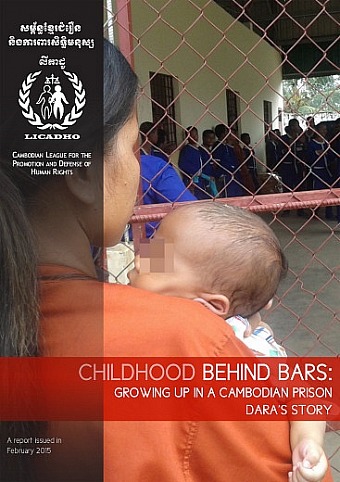Childhood Behind Bars - Growing up in a Cambodian Prison – Dara’s Story
Published on 15 February 2015Today, LICADHO releases its second and latest report in a series of case studies assessing the impact on children of growing up in Cambodian prisons. As of January 2015, there were 39 children between the ages of one month and four years living with their mothers in 18 Cambodian prisons monitored by LICADHO. Approximately half of them were born while the mother was imprisoned and almost all have never experienced or do not remember life beyond prison walls.
“Childhood behind bars: Growing up in a Cambodian prison – Dara’s story” details the experiences of such a child, ‘Dara’ (not his real name), who lived with his incarcerated mother in Kandal provincial prison, better known as Takhmao prison. Despite being regularly abused, when Dara eventually left prison in March 2013 it was not out of consideration for his safety and well-being but because he was over the age of three and the law no longer permits him to stay in prison with his mother. By this time Dara was nearly four years old and had not yet spoken a single word.
LICADHO’s first report “Childhood behind bars: Growing up in a Cambodian prison – Sokun’s story,” was published in October 2013 and told the story ‘Sokun’ (not his real name), who lived with his incarcerated mother in Phnom Penh’s Correctional Center 2 (CC2) prison until he was six years and ten months old. The report concluded that growing up in prison without proper monitoring and safeguards had caused Sokun to develop behavioral problems that outweighed the benefits gained by allowing him to live with his mother.
Even more than this first case study, Dara’s story highlights the critical importance of putting special measures in place when children are housed in Cambodian prisons with their mothers. Dara was born after his mother’s arrest and was locked away with her in an overcrowded, hot cell for many hours a day and did not access to any child appropriate recreation facilities. He also suffered numerous health problems and was hospitalized twice after not receiving timely treatment in the prison.
Dara’s mother openly admitted that she regularly beat him and that this abuse did not stop until he left prison. Despite physical signs of abuse, authorities did not act until Dara was one year old at which point the guards reportedly beat his mother in response.
“Prison authorities have to closely monitor children in prison and establish special safeguards to respond to their needs and security,” said LICADHO Prison Supervisor Nou Sam An. “Interventions that simply perpetuate the cycle of violence are wholly inappropriate, counter-productive and harmful.”
In general LICADHO supports efforts to ensure newborn babies and small children have the opportunity to remain with their detained mothers in Cambodian prisons. However, LICADHO believes that a child should only stay in prison following a comprehensive, individual assessment which takes all factors into account, including the benefits and risks.
In Dara’s case there was no such assessment, monitoring or safeguards in place. He remained in prison with his mother without question or consideration of alternative measures. If a proper assessment had been carried out initially, it would have become clear that living with his paternal grandparents was a viable alternative and Dara could have been spared the abuse, stress and deprivations that came with prison life.
“Dara’s experiences demonstrate the appalling failure of Cambodian authorities to take appropriate actions when a child is at risk,” said LICADHO Director, Naly Pilorge. “The authorities must stop sidestepping their responsibilities towards children in prisons.”
Following the release of LICADHO’s first report, it appears that both the General Department of Prisons (GDP) of the Ministry of Interior and the Ministry of Social Affairs, Veterans & Youth Rehabilitation (MoSAVY), have failed to implement any of the recommendations contained therein. The latest report contains some additional recommendations and LICADHO hopes that both the GDP and MoSAVY will act upon the new and previous recommendations to begin positively addressing the situation, ensuring that the rights of both mother and child are fully respected.
For more information, please contact:
▪ Ms. Nou Sam An, LICADHO Prison Project Supervisor– 012 493 287
▪ Ms. Naly Pilorge, Director of LICADHO– 012 803 650
PDF: Download full statement in English - Download full statement in Khmer
MP3: Listen to audio version in Khmer








